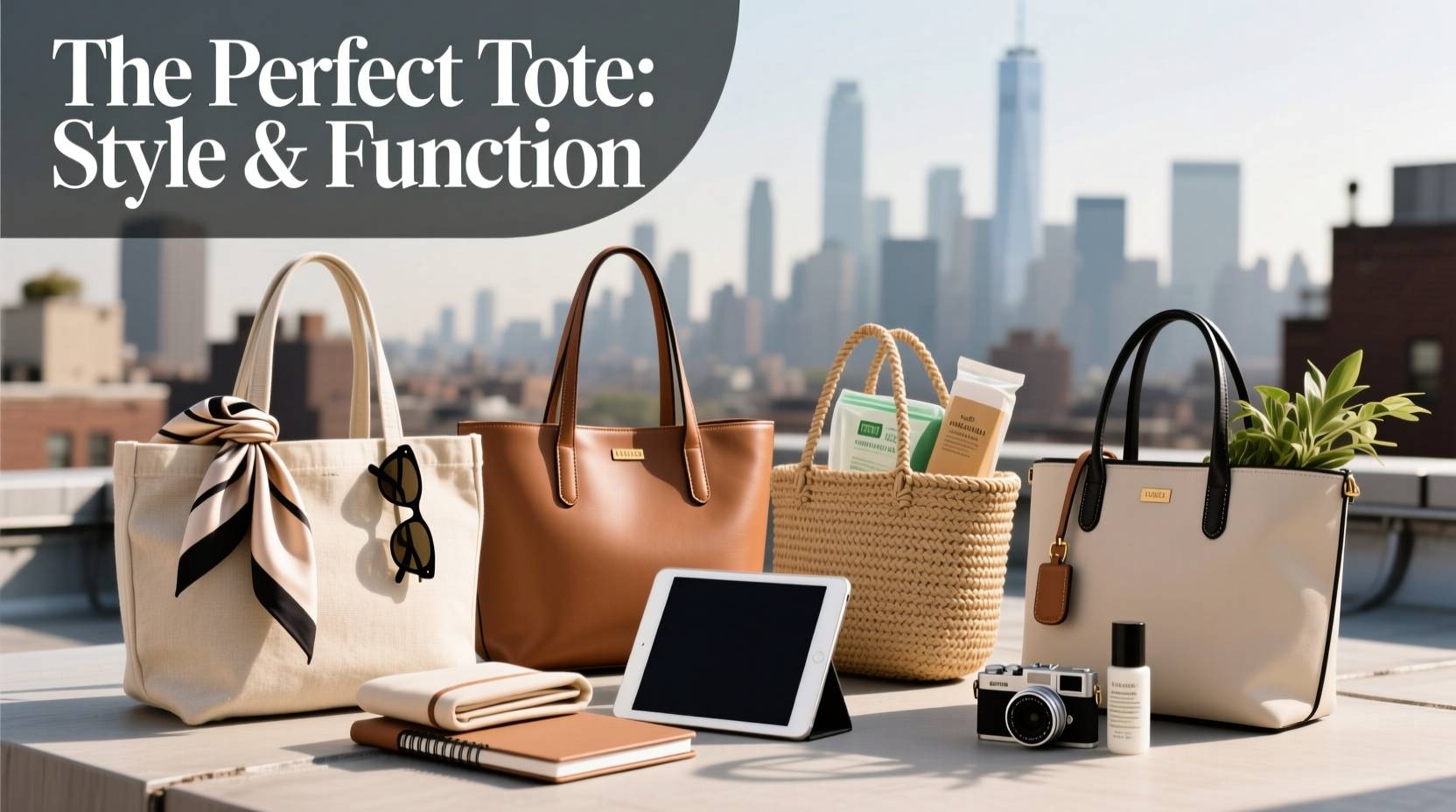A well-chosen tote bag is more than just an accessory—it’s a daily companion that carries your essentials, reflects your personal style, and withstands the rhythm of modern life. From commuting to brunches, workdays to weekend getaways, the ideal tote must balance form and function seamlessly. Yet with countless styles, materials, and price points on the market, selecting one that truly fits your lifestyle can feel overwhelming. The key lies in understanding what “versatility” means in practical terms and how to evaluate quality beyond surface appeal.
Understand Your Lifestyle Needs First

Before considering color or brand, ask yourself: What will this bag do for me every day? A tote meant for office commutes needs different features than one designed for travel or casual outings. Start by mapping out your typical week—how often you carry a laptop, whether you need room for a water bottle and lunch container, or if ease of access matters more than structure.
For professionals, a structured tote with padded laptop sleeves and interior pockets offers organization and protection. If you're constantly on the move between errands and social events, a lightweight canvas or nylon option with open-top access may be more convenient. Parents might prioritize spill-resistant linings and durable hardware, while frequent travelers look for foldable designs that double as carry-ons.
Evaluate Materials for Longevity and Care
The material of your tote directly impacts its lifespan, maintenance, and versatility. While aesthetics matter, durability should never be compromised for trendiness alone. Here's a breakdown of common materials and their real-world performance:
| Material | Pros | Cons | Best For |
|---|---|---|---|
| Full-Grain Leather | Durable, ages beautifully, water-resistant over time | Expensive, heavy when wet | Professional settings, long-term investment |
| Cotton Canvas | Lightweight, washable, eco-friendly | Stains easily, less structure | Casual use, beach trips, markets |
| Nylon or Recycled Polyester | Water-resistant, lightweight, easy to clean | Less premium feel, can show wear at stress points | Travel, outdoor activities, rainy climates |
| Saffiano (Textured Synthetic) | Scratch-resistant, low maintenance, sleek finish | Can crack over time if low quality | Urban commuting, all-season wear |
“Investing in high-quality leather isn’t about luxury—it’s about reducing waste. A properly cared-for leather tote can last 10+ years.” — Lena Torres, Sustainable Fashion Consultant
Design Features That Enhance Functionality
True versatility comes from smart design details. These elements often go unnoticed until they’re missing:
- Interior compartments: At least one zippered pocket for valuables and two slip pockets for phone and transit cards.
- Reinforced handles: Stitching should be tight and double-stitched at stress points; handles should allow shoulder carry without slipping. Base structure: A flat or slightly reinforced bottom prevents sagging and keeps contents organized.
- Closure type: Open totes offer convenience, but magnetic snaps or zippers add security in crowded spaces.
- Lining quality: Tight-weave fabric linings resist tears and stains better than flimsy alternatives.
Avoid overly decorative hardware like dangling charms or excessive embellishments—they snag on clothing and reduce practicality. Instead, opt for minimalist finishes that complement multiple outfits.
Step-by-Step: How to Test a Tote Before Buying
- Check the weight empty: A heavy bag when empty becomes exhausting after hours of use.
- Load it up: Simulate your daily load to test comfort and balance.
- Walk around: Carry it for a few minutes in-store or visualize movement if shopping online.
- Inspect stitching: Look for even, tight seams with no loose threads.
- Test closure strength: Zippers should glide smoothly; snaps should hold firmly.
- Assess drop risk: Gently shake the bag—if items shift dangerously, it lacks internal organization.
Color and Style: Choosing for Maximum Wearability
Neutral tones like black, navy, taupe, or dark brown are timeless and pair effortlessly with seasonal trends. If you prefer bolder colors, consider whether the shade complements your most-worn wardrobe pieces. A red tote looks striking—but only if you regularly wear neutrals or monochrome outfits to balance it.
Patterns and prints limit pairing options unless intentionally styled. Animal prints, florals, or bright geometrics work best as occasional-use bags rather than everyday staples.
One strategy used by stylists: select a tote in a shade already present in three or more of your core outfits. This ensures cohesion and eliminates guesswork when getting dressed.
Mini Case Study: Sarah’s Work-to-Weekend Tote
Sarah, a graphic designer in Chicago, needed a single tote for her hybrid schedule. She worked remotely two days a week but carried her tablet, sketchbook, and headphones on office days. On weekends, she used the same bag for farmers’ markets and coffee runs.
After evaluating several options, she chose a medium-sized saffiano-finish tote in warm gray. It featured a removable zip pouch for tech items, a rear slip pocket for quick access to her phone, and a wipeable interior. The color matched her black boots, beige coat, and denim jackets. Within six months, it became her only go-to bag—eliminating the need for multiple purchases.
Her decision saved money, reduced clutter, and aligned with her goal of building a capsule wardrobe.
Essential Checklist Before Purchase
Use this checklist to ensure your tote meets both aesthetic and functional standards:
- ✅ Fits your laptop or tablet (if applicable) with room to spare
- ✅ Has at least one secure interior pocket
- ✅ Handles allow comfortable shoulder or hand carry
- ✅ Made from durable, easy-to-clean material
- ✅ Neutral or complementary color to existing wardrobe
- ✅ Flat or structured base maintains shape when loaded
- ✅ No visible flaws in stitching or hardware
- ✅ Feels balanced when filled with typical contents
Frequently Asked Questions
Can a tote be both stylish and practical?
Absolutely. The most versatile totes combine clean lines with thoughtful functionality—such as hidden pockets, lightweight construction, and premium materials. Brands like Cuyana, Dagne Dover, and Polène have mastered this balance.
How do I care for my tote to extend its life?
Wipe down after each use if possible. Store in a dust bag when not in use, away from direct sunlight. For leather, condition every 3–6 months. Fabric totes can often be spot-cleaned or machine-washed on gentle, depending on care labels.
Is a more expensive tote always better?
Not necessarily. Price often reflects branding and sourcing ethics as much as quality. Focus on craftsmanship—tight stitching, solid hardware, and reputable reviews—rather than logo prestige. Some mid-range brands offer exceptional value with responsible production practices.
Final Thoughts: Build Versatility Into Your Wardrobe
Choosing the perfect tote isn't about chasing trends—it's about intentional selection. The right bag supports your routine, enhances your confidence, and reduces decision fatigue. When style aligns with substance, you gain more than an accessory: you gain efficiency, elegance, and peace of mind.
Take the time to assess your real needs, touch materials in person when possible, and prioritize longevity over impulse. A single well-chosen tote can serve you across seasons, roles, and occasions—proving that true versatility is timeless.









 浙公网安备
33010002000092号
浙公网安备
33010002000092号 浙B2-20120091-4
浙B2-20120091-4
Comments
No comments yet. Why don't you start the discussion?